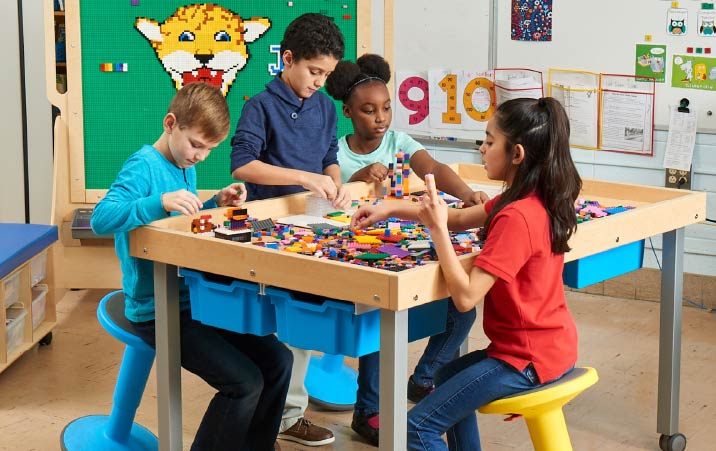Life today is a technology extravaganza. Digital evolution and the boom in smartphone adoption are defining the future of India. In the past decade, India has witnessed staggering technological advancement in the education sector itself. Today, technology is revolutionizing the education sector as well where platforms are providing students with content that enables them for the future.
While a Google-KPMG report indicates that India’s online education market is set to grow to $1.96 Bn and have around 9.6 Mn users in 2021, Indians continue to give preference to the conventional education system. The fear of exams and a one-size-fits-all approach continues to drive the education sector. Learning is still synonymous with words such as ‘board exams’, ‘entrance exams’, ‘marks’, etc, albeit digitized. We are still training children to solve exam questions and not a real-world application and problem-solving.
Building High Order Thinking of Critical Thinking and Creativity Skills
Traditional education setups continue to focus on teaching traditional subjects like English, Social Studies, Science and Math. While these are important knowledge bases but they are not enough to build higher-order thinking. Among 167 countries, India ranks 101st in overall Prosperity Index rankings and 115th in prosperity index in education. India’s lower rank among the education systems in the world reflects we are yet far away from achieving a system that focuses on the all-round development of children.
But what is high order thinking that has been largely ignored in the traditional education system? Higher-order thinking is based on Bloom’s Taxonomy, which suggests that the ultimate aim of education is when the child can use knowledge and concepts to analyze, evaluate and create something innovative. Without this, knowledge would remain superficial.
For example – sounds produced from vibration need to be connected to how medicine uses it for diagnosing diseases. We are familiar with the stethoscopes used by doctors to listen to the internal sounds and the obstetric ultrasound images, that are produced with sound waves that have frequencies higher than 20,00 Hz. Similarly, now the sound is enabling doctors to assess potentially dangerous atherosclerotic plaques, monitor chronic liver disease, and help deliver drugs to particular locations within the body.
This means making children understand the practical benefit of the acquired knowledge. It is vital to raise curiosity among students to increase the retention of knowledge, which can come only if they understand and analyze the information rather than cramming it for exams.
Major Difference Between Traditional and Non-Traditional
Non-traditional platforms allow for curriculums that don’t have to be tested in the traditional pen and paper way – this automatically helps children learn more for conceptual clarity and application rather than just learn for exams. As edtech platforms, we are not falling in the loop of digitizing the delivery of the traditional education system only but creating new pedagogical frameworks and curriculum based on boosting the child’s thinking and creative skills, all vital for life success.
For instance, under the traditional education system, teachers have no means to gauge the interest levels of students. But with the analytics tool, they get an in-depth report about every student’s performance and enable to measure the engagement level of the entire class. Since teachers can look into the course delivery and consumption patterns, it helps them design their classes as per the learning patterns of students. Real-time assessments and course correction is an extremely important tool which can help create the desired impact of education.
Furthermore, non-traditional educational platforms offer an opportunity for deeper discussion among students and teachers due to small groups. Online platforms offer the facility of 1:6 peer mentoring. While it doesn’t devoid the student of social interaction which helps build social skills, it also allows teachers to focus more on every individual. A similar experience is impossible in a traditional classroom setup of 40+ students in each class. Such closed groups and one-on-one sessions prepare students for the real world by instilling confidence in them about their ideas.
Building Skillset for the Future
In this rapidly transforming world where it is critical to cultivating 21st-century skills in our children, it is important to focus on building not only IQ but also CQ (Creative Quotient) and EQ (Emotional quotient) of the child. Edtech platforms are preparing students for the future by inculcating logical reasoning, critical thinking, creativity, communication and confidence encouraging innovation and thinking skills in children.
Classroom-based learning has been plagued with obsolete practices, leaving little room for curiosity. The knowledge disbursed at all levels of the traditional system lacks actual implementation in the real world as it remains limited to the school curriculum that hinders the development of inquisitiveness in children. Therefore, non-traditional, technologically advanced educational platforms are filling that huge cavity with their methods.
Edtech platforms like ours are focussing on application-based subjects like STEM which encourages students to use the knowledge of science and maths to engineer something new through technological intervention. Other domains like Leadership communication helps build confidence and communication skills rather than just basic grammar and comprehension.
It is safe to conclude that non-traditional education platforms are revolutionary. Their online presence makes them accessible to every student in any part of the country. The advanced courses based on subjects beyond traditional curriculums are preparing students for the real world without pushing them into a rat race of just scoring high grades. It encourages them to be a part of healthy competition where their own ideas, knowledge and understanding are given more importance than grades.
COURTESY – TIMES OF INDIA
